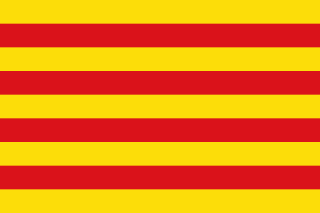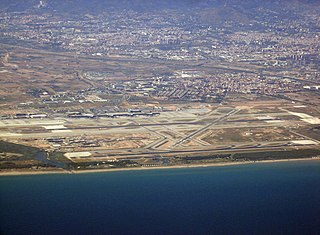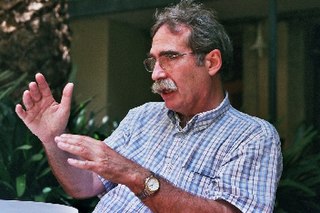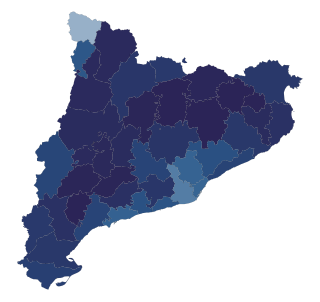Related Research Articles

Catalan nationalism is the ideology asserting that the Catalans are a distinct nation.

TV3 is the primary television channel of Catalan public broadcaster Televisió de Catalunya, a subsidiary of the CCMA. TV3 broadcasts programmes only in Catalan and Aranese, with an optional dual track in the original language for some foreign-language series and movies, although Spanish is not dubbed or subtitled. TV3 is also a founding member of FORTA.
8TV (Catalan pronunciation:[ˈbujtˈteˈβe]), formerly known as TD8 and then Citytv, was a Catalan language private TV station based in Barcelona, Spain. The channel was run by OC 2022. After a delay in the payment of its debts, it was closed on 17 October 2023.

Televisió de Catalunya is the public broadcasting network of Catalonia, one of the seventeen autonomous communities of Spain.
La Granja may refer to:

Ràdio i Televisió d'Andorra, S.A., shortened to RTVA, is the It is operated by the state's public and commercial broadcaster. and radio broadcaster in the Principality of Andorra. It operates a television channel, ATV, and two radio stations, RNA and AM, all of which broadcast in Catalan.

The Royal Palace of La Granja de San Ildefonso, known as La Granja, is an early 18th-century palace in the small town of San Ildefonso, located in the hills near Segovia and 80 kilometres (50 mi) north of Madrid, within the Province of Segovia in central Spain.

El Prat de Llobregat, commonly known as El Prat, is a municipality of Spain located in the comarca of Baix Llobregat in Catalonia. The Josep Tarradellas Barcelona–El Prat Airport largely lies within the municipal limits. It is part of the Barcelona metropolitan area.

El 33 is Catalonia's second public television channel. It belongs to Televisió de Catalunya, a subsidiary of the CCMA.

Jaume Cabré i Fabré is a Catalan philologist, novelist and screenwriter. He was one of the founders of the Catalan literary collective, Ofèlia Dracs.

Elite 1 is the top level rugby league competition in France, sanctioned by the French Rugby League Federation. The season runs from September to April, which is in contrast to the majority of other major domestic rugby league competitions worldwide. The clubs play each other home and away then they enter into a play-off series culminating with a Grand Final. The competition is the continuation and first division of the French Rugby League Championship, which has been in existence since 1934.
Television in Spain was introduced in 1956, when the national state-owned public service television broadcaster Televisión Española (TVE) started regular analog free-to-air terrestrial black and white broadcasts. Colour transmissions started in 1972 after two years of test transmissions, with all programming transmitted in color in 1977, and colour commercials starting in 1978. TVE held a monopoly on television broadcasting until regional public channels were launched during the 1980s and commercial television started nationwide in 1990. Digital terrestrial television was launched on 30 November 2005 with analog service discontinued on 3 April 2010. Currently, television is one of the leading mass media of the country, and by 2008 was in 99.7% of households in Spain according to INE statistics.

Univision is an American Spanish-language free-to-air television network owned by TelevisaUnivision. It is the United States' largest provider of Spanish-language content. The network's programming is aimed at the Latino public and includes telenovelas and other drama series, sports, sitcoms, reality and variety series, news programming, and imported Spanish-language feature films. Univision is headquartered in Midtown Manhattan, New York City, and has its major studios, production facilities, and business operations based in Doral, Florida.
Mercè Company i González is a Spanish writer in Spanish, Catalan and French languages.

La Granja d'Escarp is a municipality in the comarca of the Segrià in Catalonia, Spain.

The Real Fábrica de Cristales de La Granja is a glass factory in San Ildefonso near Segovia, Spain. It was built as a royal manufactory in the eighteenth century. It is 7 miles (11 km) south east of Segovia on the CL-601 road.

A non-binding Catalan self-determination referendum, also known as the Citizen Participation Process on the Political Future of Catalonia, was held on Sunday, 9 November 2014, to gauge support on the political future of Catalonia. While also referred to as "Catalan independence referendum", the vote was rebranded as a "participation process" by the Government of Catalonia, after a "non-referendum popular consultation" on the same topic and for the same date had been suspended by the Constitutional Court of Spain.

The Catalan Republic was a state proclaimed in 1931 by Francesc Macià as the "Catalan Republic within the Iberian Federation", in the context of the proclamation of the Second Spanish Republic. It was proclaimed on 14 April 1931, and superseded three days later, on 17 April, by the Generalitat de Catalunya, the Catalan institution of self-government within the Spanish Republic.

Federalism in Spain began in the 1830s, although it has its roots in the 1790s. The first and only attempt to establish a federal state in Spain occurred during the First Spanish Republic (1873-1874). After this failure, federalism was a minority political current. In the Second Spanish Republic and in the Transition, an intermediate model was chosen between federalism and centralism — the integral state, in the first case; and the regional state in the second.

The Assembly of Catalonia was a unitary body of the anti-Francoist opposition of Catalonia created in November 1971. Its fundamental demands were the demand for democratic freedoms, the general amnesty for political prisoners and the achievement of the statute of autonomy, which were synthesized in the motto of Freedom, Amnesty, Statute of Autonomy. In addition to the political parties—all of them clandestine—forces of various kinds were part of it, such as trade union organizations, professional groups, representatives of the university movement, neighborhood movements, Christian groups, regional assemblies, etc. The objectives of the Assembly were achieved during the democratic transition, especially when the Cortes approved the Statute of Autonomy of Catalonia in 1979.
References
- ↑ Records que travessen ‘La granja’» (in Catalan). Diari Ara. Toni Vall, 2015-12-19.